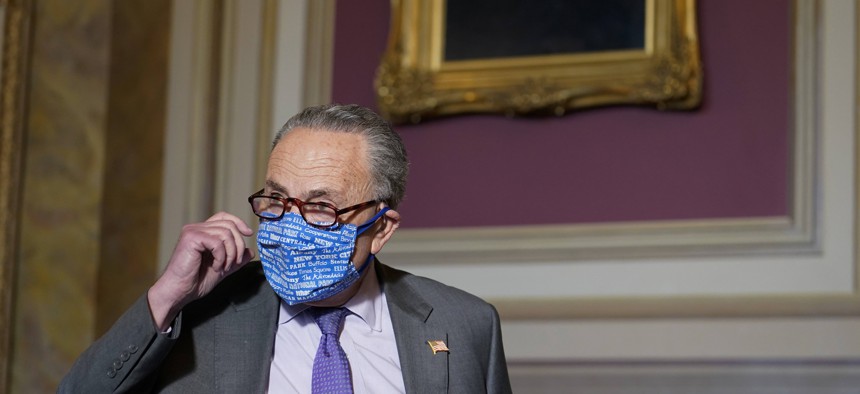Schumer Says $2,000 Checks Will Be Top Priority for Democratic-Controlled Senate

Senate Minority Leader Sen. Chuck Schumer of N.Y., takes off his mask as he arrives to speak to reporters on Capitol Hill in Washington, Wednesday, Dec. 30, 2020. AP Photo/Susan Walsh
Payments of this size have lacked support among Republicans.
Delivering $2,000 checks to many Americans as the nation continues to grapple with the coronavirus will be a top priority when Democrats assume control of the Senate, presumptive majority leader Sen. Chuck Schumer, said Wednesday.
Schumer made his remarks before the Capitol descended into a scene of chaos and violence, with rioting Trump supporters storming the building. The New York lawmaker declined to elaborate on whether the payments might be included in a standalone bill, or packaged into some sort of broader coronavirus relief measure.
"One of the first things that I want to do when our new senators are seated, is deliver the $2,000 checks to the American families," Schumer said. "Our caucus is strongly for it."
The Senate will be evenly divided between Democrats and Republicans after two Democratic candidates won runoff elections in Georgia this week. Democrats will be able to turn to Vice President-elect Kamala Harris to cast tie-breaking votes. But filibuster rules currently limit what types of legislation can pass the chamber with a simple majority.
Democrats already control the House.
President Trump and Democrats at the end of the year proposed sending $2,000 payments to Americans as part of federal coronavirus relief efforts. But the idea lacked support from key Republicans in Congress—although some GOP lawmakers did get behind it.
Instead of $2,000 payments, many people who earned up to $75,000 in 2019 received up to $600 under virus relief legislation Trump signed into law at the end of December. An earlier relief bill delivered similar payments of up to $1,200.
One reason the payments have been criticized is that they are not only going to people experiencing economic woes due to the virus, but also households that aren't dealing with financial hardship or job losses.
From a state and local budget perspective, federal measures like the special payments to individuals, aid to businesses, and boosted unemployment benefits are generally seen as a plus. This is because the money is helping prop up economic activity—and in turn tax revenue—at a time of instability and as many households are struggling because of the pandemic.
Bill Lucia is a Senior Reporter for Route Fifty and is based in Olympia, Washington.
NEXT STORY: Poverty Grows Despite Economic Recovery






